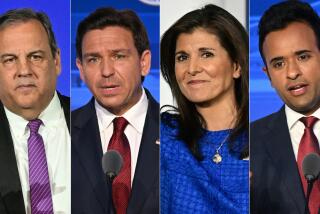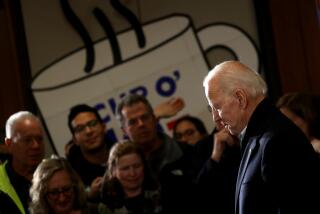Buchanan, Bush Swap Feisty Jabs in Late Rounds
- Share via
MANCHESTER, N.H. — President Bush, feisty but fighting fatigue, and Patrick J. Buchanan, just plain feisty, sparred with sharpened rhetoric across the dreary and rain-splattered landscape of southern New Hampshire on Sunday to pursue the last undecided voters in Tuesday’s crucial Republican primary election.
With little time left, tempers were fraying and the candidates were snapping ever more pointedly, both camps accusing the other of late-in-the-game desperation.
Still refusing to address his opponent by name but clearly aiming invective in his direction, the President said that challengers could “do the campaign rhetoric” but that he had had to make the tough decisions.
“Phil Donahue might be President of the United States if you needed somebody to be out there on television,” Bush declared in a jab at former television commentator Buchanan.
“Lonely voices say I’m compromising too much,” he added. “That’s the only way you can lead when you don’t control the Congress.”
Bush’s defensiveness was met with more than disdain by Buchanan, whose sarcasm toward the President has dripped ever heavier as Primary Day approaches.
Buchanan defended his harshly anti-Bush advertising campaign--denounced by the President on Saturday as “outright lies”--and belittled Bush for campaigning with muscleman-actor Arnold Schwarzenegger.
“It’s too late even for the Terminator to save Mr. Bush,” Buchanan sneered at a midday press conference in a reference to one of Schwarzenegger’s famous roles.
Even his own aides have complained that Bush has spent too little time in New Hampshire, where the ravaged economy has made for volatile political conditions. So for the second straight day, Bush played catch-up by deploying his entourage in a classic retail campaign.
He gobbled down bacon and pancakes and chatted up his seatmates at Pennichuck Junior High School in Nashua. Then he sat through a 70-minute service at the First Congregationalist Church nearby, where he closed his eyes with what appeared to be fatigue. Later, he held court in an “Ask George Bush” session at a Hollis high school before returning to the White House.
Bush, who has been lambasted by Buchanan and the Democrats seeking the presidency as a patrician unable to commiserate with the plight of everyday Americans, went out of his way Sunday to demonstrate empathy.
To a questioner who wondered whether the President could understand other people’s problems, Bush recalled the illness of his daughter Robin, who died of leukemia in 1953 just two months short of her 4th birthday.
“Barbara and I lost a child,” said Bush, who rarely discusses Robin. “I wouldn’t suggest that if that experience hadn’t come to your family, that you would be less concerned about a neighbor who went through that.”
At the $5-a-plate breakfast where he wandered between tables shaking hands and signing autographs, the President again sought to put himself on an entirely different plane from Buchanan, a former speech writer for Richard M. Nixon and Ronald Reagan who has urged voters to send a message to Bush by voting him down on Tuesday.
His opponents, Bush said, “just don’t have a clue as to where this country should be going or what to do about the problems that exist. . . . When you vote, you’ve got to understand the new world, the world after the Cold War. I’ll claim to be second to none in terms of working for world peace.”
In an obvious attempt to scramble onto the presidential level, Buchanan on Sunday began airing a half-hour campaign commercial in New Hampshire that emphasized his service to Nixon and Reagan with a series of fuzzy newspaper pictures featuring them--and Buchanan--with world leaders.
That was Buchanan’s lone foray into positive campaigning, however--as the election edges nearer, he swings at Bush with abandon. He has flooded the airwaves with accusations that Bush abandoned the middle class--based on the President’s decision not to include a $500-per-child tax exemption in his short-term economic revival package. Bush proposed the exemption in last month’s State of the Union address.
“New Hampshire, don’t be fooled again,” Buchanan’s ad says, in a reference to the state’s 1988 support of Bush.
Although the $500 exemption was not included in the narrow budget package Bush sent to Congress with a demand for action by March 20, it was included in the larger Bush Administration economic bill to be considered later this year.
Nevertheless, Buchanan defended his approach before reporters Sunday. “George, it is only the truth that hurts,” he said.
“Mr. Bush came up here to New Hampshire and said, ‘No new taxes’ and broke his word,” Buchanan said. “It is Mr. Bush who said he wanted that middle-class tax cut right away and then failed to put it in the proposal he sent to Congress to be passed right away.”
Buchanan held to a light campaign schedule Sunday, appearing on a Boston news show before his press conference and delivering a speech in Manchester later in the evening.
As he has throughout his 10-week campaign, Buchanan deflected questions about his own proposals and repeatedly turned his fire on Bush, interrupted only by taunting from AIDS activists.
The acid negativism extended even to his answer when Buchanan was asked what he would do his first day as President: “Probably make arrangements to speak at the George Bush (presidential) library.”
Both candidates were vying to control expectations of Tuesday’s results.
Trying to dismiss Buchanan as desperate, the Bush camp was simultaneously playing down the President’s own prospects.
The Buchanan forces, meanwhile, were all over the mat in trying to avoid being pinned down to a prediction about Tuesday’s results.
More to Read
Get the L.A. Times Politics newsletter
Deeply reported insights into legislation, politics and policy from Sacramento, Washington and beyond. In your inbox three times per week.
You may occasionally receive promotional content from the Los Angeles Times.











